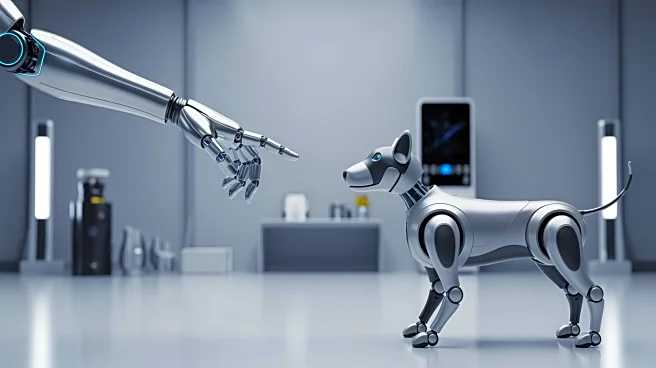What's Happening?
Leju Robotics Technology Co., a Chinese company, has raised approximately $200 million to advance its humanoid robot production. The funding will support research and development, mass production preparations,
and partnerships with major Chinese firms like Huawei, Alibaba, and Haier. Leju, which emerged from the Harbin Institute of Technology in 2016, focuses on robots for education, healthcare, and elder care. Meanwhile, Unitree Robotics, also founded in 2016, has introduced its H2 Destiny humanoid robot, designed for service applications. Unitree's new robot is available in commercial and educational models, with the commercial version priced at $29,000. Both companies are reportedly planning initial public offerings (IPOs).
Why It's Important?
The developments by Leju and Unitree highlight the growing interest and investment in humanoid robotics, particularly in China. This sector is poised for significant growth, with Morgan Stanley predicting a potential $5 trillion market by 2050. The advancements in humanoid robots could revolutionize various industries, including healthcare, education, and service sectors, by providing innovative solutions and enhancing productivity. The involvement of major Chinese companies and investors underscores the strategic importance of robotics in China's economic and technological landscape. As these companies move towards IPOs, they could attract further investment and accelerate the commercialization of humanoid robots.
What's Next?
Leju and Unitree's plans for IPOs suggest a strategic move to secure additional capital for expansion and innovation. The success of these IPOs could set a precedent for other robotics companies, potentially leading to increased investment in the sector. As these companies continue to develop and commercialize their humanoid robots, they may face competition from global players, necessitating continuous innovation and strategic partnerships. The broader implications for the robotics industry include potential regulatory considerations and the need for workforce development to support the integration of humanoid robots into various sectors.
Beyond the Headlines
The rise of humanoid robots raises ethical and societal questions about the future of work and human-robot interaction. As robots become more integrated into daily life, issues such as privacy, security, and the displacement of human jobs may become more prominent. Additionally, the development of humanoid robots could influence cultural perceptions of technology and automation, potentially leading to shifts in consumer behavior and societal norms.









